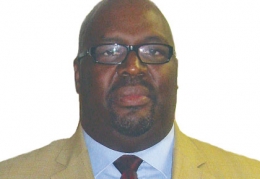South Africa’s Ambassador to Ireland Jeremiah Ndou has had a perhaps less tumultuous four years after previous missions to Libya and Zimbabwe. Yet as he tells Lois Kapila, it’s impossible to distil his tenure down to a few important moments ‘when they were all important’
Just four years ago, the Irish Government still based its relations with African countries on development aid. Today, it’s more about trade, says South African Ambassador Jeremiah Ndou on a recent Tuesday afternoon in his second-floor embassy office in central Dublin.
Soon to return to South Africa after a four-year posting in Dublin, Ambassador Ndou – a sharply dressed, large man with chunky black-rimmed glasses that make him look more like a graphic designer than a veteran diplomat – counts this shift in approach as one of the “key” successes of his time here.
The Irish Government devised its new Africa Strategy as focused on trade, and in February 2012 it opened sub-Saharan Africa’s first Enterprise Ireland office in Johannesburg, to help businessmen looking for opportunities in the country.
“It has gone very well… benefitting more Ireland than us,” the ambassador chuckles. “I mean, in terms of the trade balance [it] is more skewed towards Ireland. They are doing more work in South Africa than South African companies are doing here.”
The trade push doesn’t mean there’s no room for development aid, though; it’s just about getting the balance right, Ndou says. Irish Aid is gradually reducing its support but “we are engaging them to try and see if they mind… still remaining in South Africa.”
Diplomacy is engaging
Ambassador Ndou seems amused by the idea of an interview summing up his accomplishments thus far. “Important moments? They were all important moments,” he laughs heartily, before sipping from a delicate china teacup.
A former activist with the African National Congress (ANC) Youth League activist and later a parliamentarian in his homeland, Ambassador Ndou has now been out of South Africa for almost 15 years, working in Zimbabwe and Libya before being dispatched to Europe.
All the high-level diplomacy is engaging, he says, but at times he misses the community engagement that his earlier work used to bring; he misses seeing grassroots projects from beginning to end. Perhaps that’s why some of the highlights of his time here are concrete projects like the scholarship programme he helped to set up last year.
Under the Kader Asmal Fellowship Programme, named after the South African politician and anti-apartheid campaigner who taught law for decades at Trinity College Dublin, at least 10 students will head from South Africa to Ireland each year for post-graduate studies.
“This year we have only two students because it was late, but next year we will have the full complement of 10,” he says, adding that he has also been discussing plans to link universities in Ireland and South Africa to encourage more visiting students.
Skills training and education are top priorities for the government in Pretoria, and areas where the ambassador hopes Ireland can help out. The South African government “has committed itself to looking at the issue of skills development and looking at ways that we as diplomats wherever we are can tap into this expertise in those countries,” he says.
South Africa has also welcomed the “concrete” help from Ireland in developing Special Economic Zones, drawing on Irish experience with the Shannon project, he explains.
With thousands of South African nationals in Ireland, they too can play a role in bringing the two countries together. Ambassador Ndou’s office has been identifying people who want to use knowledge they have acquired in Ireland to help build South Africa, he says.
Commitment and dedication
The bulk of Ambassador Ndou’s work here – trade relations and lobbying for Irish support at multilateral forums – has been very different to his last two missions in Zimbabwe and Libya. He won’t be drawn on the European Union’s move to lift some sanctions against Zimbabwe, stressing that the country is no longer his turf. He does admit, though, that he got so involved in Zimbabwe that sometimes he still forgets where he is.
“On Saturday, there was a function organised for me and as I was talking there I was referring to Dublin and I ended up saying ‘in Harare’ and they all laughed.”
Closer to Dublin, he has been watching the progress of the peace process in Northern Ireland and the recent, renewed calls for a truth commission with some interest, the South African experience always at the back of his mind.
“One advantage [of a truth commission] is that it enables people to come forward and tell the truth. Which most people did in South Africa, not all of them, especially from the other side, but most people did,” he says.
“But the post-truth commission process, the process of healing, the process of reconciliation, in some instances they succeed; in some instances, people still have an anger and resentment towards other people.”
Moreover, he says the agreement “itself doesn’t bring peace. What brings peace is the commitment and dedication of those involved towards the terms of the agreement, and how far they are willing to go to reach out to the other side to make sure that they hold each other’s hands and move forward.”
While he doesn’t know what his next job will be, Ndou has his fingers crossed for a post at the African Union or a multilateral agency that would led him pursue his interest in peace-making. “It’s more active,” he says, putting his fists up into a mock-boxer pose.
But that’s for later, after he’s had time to get reacquainted with his home country. First stop will be his rural home, he said. “I miss my countryside. And then normally when I arrive there, the first thing we do is slaughter a goat and enjoy the meat.”
This interview was conducted before the death of Nelson Mandela.












